The SSD Relapse: Understanding and Choosing the Best SSD
by Anand Lal Shimpi on August 30, 2009 12:00 AM EST- Posted in
- Storage
What's Wrong with Samsung?
The largest SSD maker in the world is Samsung. Samsung makes the drives offered by Apple in its entire MacBook/MacBook Pro lineup. Samsung makes the drives you get if you order a Lenovo X300. In fact, if you're buying any major OEM system with an SSD in it, Samsung makes that drive.
It's just too bad that those drives aren’t very good.
This is the 4KB random write performance of Samsung's latest SSD, based on the RBB controller:
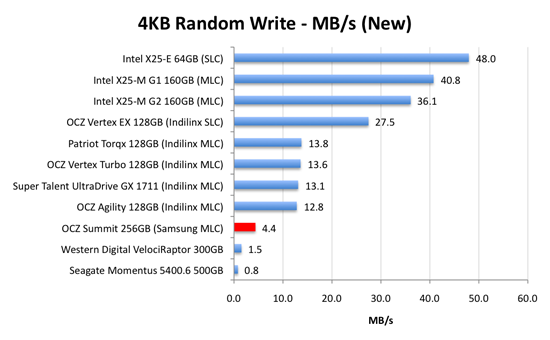
4.4MB/s. That's 3x the speed of a VelociRaptor, but 1/3 the speed of a cheaper Indilinx drive.
Speedy, but not earth shattering. Now let's look at performance once every LBA has been written to. This is the worst case scenario performance we've been testing for the past year:
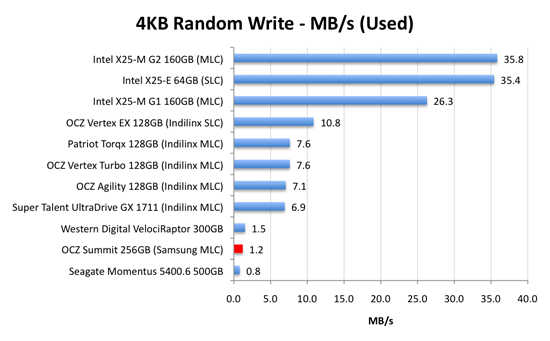
...and now we're down to mechanical hard drive speeds
Holycrapwtfbbq? Terrible.
Now to be fair to Samsung, this isn’t JMicron-terrible performance. It’s just not worth the money performance.
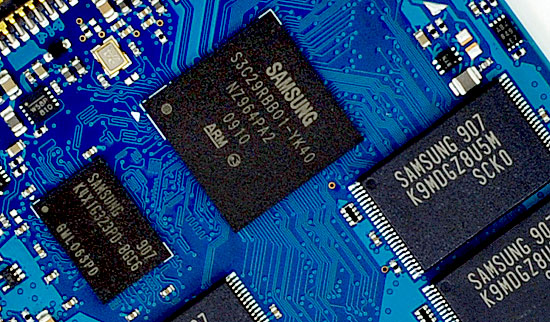
The Samsung RBB based SSDs are rebranded by at least two manufacturers: OCZ and Corsair.
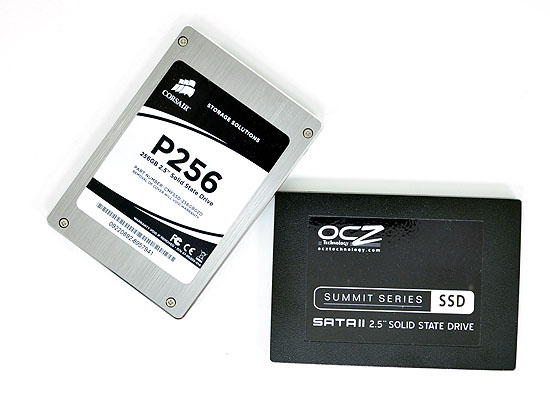
The OCZ Summit and the Corsair P256 both use the Samsung RBB platform.
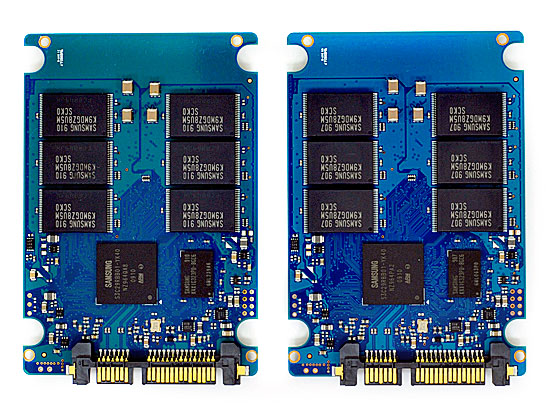
The Corsair and OCZ Samsung RBB drives.
The drive most OEMs are now shipping is an even older, lower performing Samsung SSD based on an older controller.
I talked to some of the vendors who ship Samsung RBB based SSDs and got some sales data. They simply can’t give these drives away. The Indilinx based drives outsell those based on the Samsung RBB controller by over 40:1. If end users are smart enough to choose Indilinx and Intel, why aren't companies like Apple and Lenovo?
Don't ever opt for the SSD upgrade from any of these OEMs if you've got the option of buying your own Indilinx or Intel drive and swapping it in there. If you don't know how, post in our forums; someone will help you out.
Samsung realized it had an issue with its used-state performance and was actually the first to introduce background garbage collection; official TRIM support will be coming later. Great right? Not exactly.
There’s currently no way for an end user to flash the firmware on any of these Samsung drives. To make matters worse, there’s no way for companies like OCZ or Corsair to upgrade the firmware on these drives either. If you want a new firmware on the drive, it has to go back to Samsung. I can’t even begin to point out how ridiculous this is.
If you’re lucky enough to get one of the Samsung drives with background garbage collection, then the performance drop I talked about above doesn’t really matter. How can you tell? Open up Device Manager, go to your SSD properties, then details, then select Hardware Ids from the dropdown. Your firmware version will be listed at the end of your hardware id string:
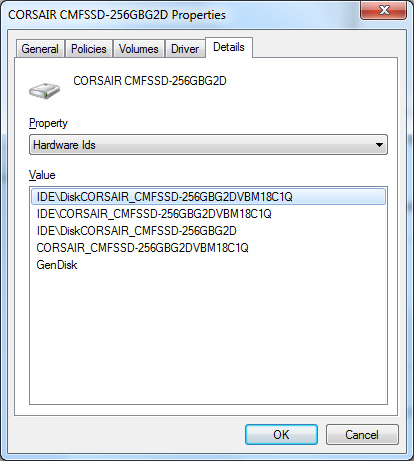
Version 1801Q doesn’t support BGC. Version 18C1Q (or later) does.
How can you ensure you get a model with the right firmware revision? Pick a religion and start praying, because that’s the best you can do.
Now the good news. When brand new, the Samsung drives actually boast competitive sequential write, sequential read and random write speeds.
These drives are also highly compatible and very well tested. For all of the major OEMs to use them they have to be. It’s their random write performance that’s most disappointing. TRIM support is coming later this year and it will help keep the drives performing fresh, but even then they are still slower than the Indilinx alternatives.
There’s no wiper tool and there’s currently no method to deploy end-user flashable firmware updates. Even with TRIM coming down the road, the Samsung drives just don’t make sense.










295 Comments
View All Comments
CList - Tuesday, September 1, 2009 - link
Don't be disgusted at Newegg, be disgusted at the people who are willing to pay the premium price! Newegg is simply playing a reactionary role in the course of natural free-market economics and cannot be blamed. The consumers, on the other hand, are willing participants and are choosing to pay those prices. When no one is left who is willing to pay those prices, Newegg will quickly lower them.Cheers,
CList
gfody - Tuesday, September 1, 2009 - link
I don't understand how consumers have any control over what Newegg is charging for the 160gb that's not even in stock yet.If Newegg wants to get the absolute most anyone is willing to pay for every piece of merchandise they may as well just move to an auction format.
DrLudvig - Tuesday, September 1, 2009 - link
Yeah, if you look at intel's website, http://www.intel.com/cd/channel/reseller/asmo-na/e...">http://www.intel.com/cd/channel/reselle...na/eng/p..., you will se that the R5 includes "3.5" desktop drive bay adapter to 2.5" SSD adapter bracket, screws, installation guide, and warranty documentation.Why on earth Newegg is charging that much more for it i really don't know, here in denmark the R5 retails for about 15 bucks more than the C1.. Which really isn't that bad..
Mr Perfect - Tuesday, September 1, 2009 - link
Whoa. That's it? An adapter kit? With that kind of price difference, I expected it to be the D0 stepping of SSDs or something.Thanks for clearing that up.
NA1NSXR - Monday, August 31, 2009 - link
The reason not being that performance or longevity is not good enough, but because improvements are still coming too quickly, and prices falling fast still. Once the frequency of significant improvements and price drops slow down, I will more seriously consider an SSD. I suppose it depends on how much waiting on the I/O you do though. For me, it is not so much that a Velociraptor is intolerable.bji - Tuesday, September 1, 2009 - link
Perhaps this is what you meant, but you should really clarify. It's still not time for YOU to buy an SSD. SSDs represent an incredible performance improvement that is well worth the money for many people.DragonReborn - Monday, August 31, 2009 - link
say i wanted to go crazy (it happens)...should i get two 80gb intel g2's or the 160gb intel g2? same space...is the RAID 0 performance worth it?i have all my important data backed on a big 2tb drive so the two ssd's (or 1 160gb) will just hold my OS/progs/etc.
thoughts?
kensiko - Monday, August 31, 2009 - link
I would say that in real world usage, you won't notice a huge difference between RAID and not RAID, SSD are already fast enough for the rest of the system. Also, TRIM may not work for now in RAID configuration.Just look at Windows Start up, no difference between Gen2 SSD!
Gc - Monday, August 31, 2009 - link
This is a nice article, but the numbers leave an open question.What is Samsung doing right? Multiprocess/multithread performance?
The article finds Samsung drives performance is low on 2MB reads,
(new 2MB sequential reads not given, assume same as 'used')
used 2MB sequential reads (low rank, 79% of top)
good on 2MB writes:
new 2MB sequential writes (middle rank, 89% of top)
used 2MB sequential writes (2nd place, 91% of top)
and horrible on 4KB random files:
(new 4KB random reads not given, assume same as 'used')
used 4KB random read (bottom ssd ranked, only 36% of top)
new 4KB random write (low rank, only 9% of top)
used 4KB random write (bottom ssd ranked, only 3% of top, < HD)
Yet somehow in the multitasking Productivity test and Gaming test, it was surprisingly competitive:
multitasking productivity (mid-high rank, 88% of top)
gaming (mid-high rank, 95% of top)
The productivity test is described as "four tasks going on at once, searching through Windows contacts, searching through Windows Mail, browsing multiple webpages in IE7 and loading applications". In other words, nearly all READS (except maybe for occasionally writing to disk new items for the browser history or cache).
The gaming test is described as "reading textures and loading level data", again nearly all READS.
Q. Given that the Samsung controller's 2MB read performance and
4KB read performance are both at the bottom of the pack, how
did it come out so high in the read-mostly productivity test
and gaming test?
Does this indicate the Samsung controllers might be better than Indilinx for multiprocess/multithreaded loads?
(The Futuremark pdf indicates Productivity 2 is the only test with 4 simultaneous tasks, and doesn't say whether the browser tabs load concurrently. The Gaming 2 test is multithreaded with up to 16 threads. [The Samsung controller also ranks well on the communications test, but that may be explained: Communications 1 includes encryption and decompression tasks where Samsung's good sequential write performance might shine.])
Since many notebooks/laptops are used primarily for multitasking productivity (students, "office"-work), maybe the Samsung was a reasonable choice for notebook/laptop OEMs. Also, in these uses the cpu and drive are idle much of the time, so the Samsung best rank on idle power looks good. (But inability to upgrade firmware is bad.)
(The article doesn't explain what the load was in the load drive test, though it says the power drops by half if the test is switched to random writes; maybe it was sequential writes for peak power consumption. It would have been helpful to see the power consumption rankings for read-mostly loads.)
Thanks!
rcocchiararo - Monday, August 31, 2009 - link
Your prices are way off, newegg is charging ludicrous ammounts right now :(also, the 128 agility was 269 last week, i was super exited, then it went back to 329, and its now 309.